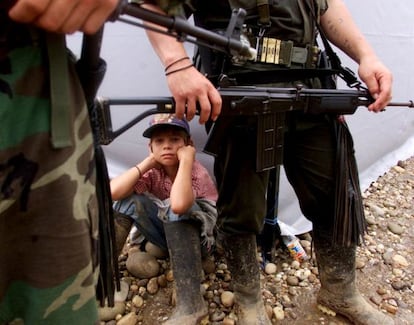“I wish they would stop hunting down young girls”
An average of 27 children are raped daily in Colombia's armed conflict, say NGOs

If you could change anything, what would you change?
“For them to stop hunting down little girls,” says one boy who lives in a department in north Colombia that has been ravaged by decades of violence stemming from a bloody insurgency. His answer – to a Catholic Church organization’s question – sums up the critical situation faced by children who have become victims of rape and sexual assault committed by both armed criminals and law enforcement groups.
There are no current statistics – or even estimates – on the number of children and adolescents who have been sexually abused. NGOs and charitable organizations have come up with their own numbers but, because those figures differ, it is difficult to paint an accurate picture.
In a recent report, British NGO Oxfam said that 48,915 victims under the age of 18 were sexually abused in Colombia between 2008 and 2012. Of that number, Oxfam said 41,000 are girls and the rest boys – all victims of Colombia’s armed conflict. If that is the case, then an average of 27 rapes or sexual assaults of children took place on a daily basis during that time period.
For years this type of sexual violence has been quite invisible”
Now, for the first time, Colombian authorities are trying to come up with some real statistics. “Even though these numbers are not written in stone, they open up a public debate on the problem,” says Diana Arango, coordinator of the campaign Saquen mi cuerpo de la guerra (Take my body out of this war). The initiative was begun in 2009 by around 10 rights organizations, who came together to denounce how sexual violence is being used as a terror tactic by guerrillas, paramilitaries and the police in Colombia’s ongoing war against an insurgency.
In 2010, Oxfam said that 480,000 women had been the victims of sexual assaults over the previous decade, but at the time that figure didn’t include girls.
“For years this type of sexual violence in this country has been quite invisible. Even when it was brought up, there were more discussions about the number of girls and teenagers who have suffered. The boys were ignored, which only added to greater social stigma because many of these cases were categorized as being homosexual,” says Arango.
Investigations have been limited to examining rape cases without looking at other forms of abuse
Social workers and organizations have not been able to determine which groups are the biggest culprits. “Information does exist but it is sparse and incomplete,” says Arango. For this reason, the exact ages of the victims is unknown, as is whether they are from Afro-Caribbean or indigenous communities, which live in the north part of the country. It is also difficult to determine whether the perpetrator is a guerrilla, paramilitary or a soldier.
Investigations have also been limited to examining rape cases without looking at other forms of abuse. “Many accepted practices are not considered sexual abuse crimes even though for legal purposes they are,” according to Oxfam, which explained in its report that the concept of “being in love” is a common interpretation of many abuse situations.
“In areas where there are armed groups of men, girls are often seduced so that they can work as couriers, obtain information, or recruit other children,” the report says.
Most of these cases are never reported and many of the victims do not receive medical care
In the larger cities such as Medellín, Bogotá and Cúcuta (which borders Venezuela), investigators found that it was common for such “consensual” relationships to exist between girls as young as 12 years of age and men who are part of the conflicts. “The armed groups are the ones that decide whether or not a certain girl can go to a party. But when the ‘authority’ is crossed, the result generally is murder or abandonment.”
Investigators also found that most young girls lose their virginities at an early age while under the influence of drugs. There have been cases in which young children are being trafficked solely for sexual purposes by these groups. In Colombia’s Pacific region, where there is consistent warfare between criminal groups, children are usually raped and assaulted as an act of vengeance.
Nevertheless, most of these cases are never reported and many of the victims do not receive medical care. The worst part, according to the NGOs, is that the authorities have done little to combat the problem in these remote areas, where impunity reigns.
Tu suscripción se está usando en otro dispositivo
¿Quieres añadir otro usuario a tu suscripción?
Si continúas leyendo en este dispositivo, no se podrá leer en el otro.
FlechaTu suscripción se está usando en otro dispositivo y solo puedes acceder a EL PAÍS desde un dispositivo a la vez.
Si quieres compartir tu cuenta, cambia tu suscripción a la modalidad Premium, así podrás añadir otro usuario. Cada uno accederá con su propia cuenta de email, lo que os permitirá personalizar vuestra experiencia en EL PAÍS.
¿Tienes una suscripción de empresa? Accede aquí para contratar más cuentas.
En el caso de no saber quién está usando tu cuenta, te recomendamos cambiar tu contraseña aquí.
Si decides continuar compartiendo tu cuenta, este mensaje se mostrará en tu dispositivo y en el de la otra persona que está usando tu cuenta de forma indefinida, afectando a tu experiencia de lectura. Puedes consultar aquí los términos y condiciones de la suscripción digital.








































